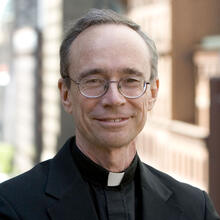Discernment of how the Spirit is leading the church is at the heart of Pope Francis’ plans for the Synod on Synodality, but anyone who thinks discernment is easy is bound to get into trouble. It is very easy for us to believe that our desires and opinions are inspired by the Spirit and that everyone else is wrong. Dialogue becomes that much more difficult when you feel that God is on your side.
Francis, as a Jesuit and spiritual director, knows this. He therefore insists that prayer, spiritual conversation and especially listening are essential to the synodal process.
We must approach discernment with humility, recognizing our biases can easily taint the discernment process. St. Ignatius, the great teacher of discernment, notes how we must approach discernment with “indifference,” a readiness to accept God’s will whatever it may be.
We must approach discernment with humility, recognizing our biases can easily taint the discernment process.
My own life is filled with discernments that were wrong. In my 20s, I was convinced God was calling me to go to El Salvador for regency, the two- to three-year period of ministry in Jesuit formation before studying theology. My provincial said no, which may have saved me from getting killed with the Jesuits at the Jesuit university in San Salvador.
Later, I was convinced God wanted me to run the Jesuit social justice office in Washington. The search committee disagreed, which made me available to work at America magazine. Then, in the mid-1980s, I was convinced I should be editor of America. Again, the search committee said no, which freed me up to write a series of books on the politics and organization of the church before I eventually became editor.
Even St. Ignatius failed to get it right all the time. Most notably, he was convinced God wanted him to go to Jerusalem to spend his life begging and preaching the gospel. When he finally got there, the Franciscans, who were in charge of the Catholic presence in the Holy Land, took one look at him and told him to go home.
Even St. Ignatius failed to get it right all the time. The Franciscans, who were in charge of the Catholic presence in the Holy Land, took one look at him and told him to go home.
Thank God the Franciscans had more sense than Ignatius; otherwise, there would be no Society of Jesus today.
Ignatius’ most documented discernment was over the practice of poverty in the Jesuits. He resolved that it should be very strict, that Jesuit houses should depend on begging and that our schools should not charge tuition or have endowments.
Needless to say, that proved unrealistic in the real world.
My discernments and Ignatius’ desire to live in the Holy Land were countered by religious authorities who told us we were mistaken. In each case, something better resulted than what we had originally hoped for. As Isaiah told us in the first Scripture reading last Sunday, “For my thoughts are not your thoughts, nor are your ways my ways, says the Lord.”
Religious authority and practical reality can sometimes show us that even when we think we know God’s will, we may need to reflect again. I am not denying that religious authority can sometimes get in the way of the Spirit, but it can also sometimes save us from ourselves.
Religious authority and practical reality can sometimes show us that even when we think we know God’s will, we may need to reflect again.
Life has taught me that I am not a very good discerner, but it has also taught me that often things turn out better when I don’t get what I want. I have learned the importance of consulting others before making a decision. Listening to others is an important way of listening to the Spirit.
During the synod next month, we will all need patience and humility as the delegates try to discern in what direction the Spirit is calling us to travel. It will take prayer, spiritual conversation and listening to hear the Spirit.
Consensus, let alone unanimity, will not come easily. There is always the danger that the most opinionated and most vocal will overwhelm the less vocal, which is why votes may be required to test the views of the entire body. Sometimes the Spirit shows itself in voting during synods, as happens also in ecumenical councils and conclaves.
Francis is calling the church to a synodal process, a communal discernment process. This will not be easy. People will hear the Spirit saying different things. Mistakes will be made. But we must have faith that the Spirit is working in the church. We must have hope based on this faith. And we must have love for everyone, even those who hear the Spirit saying something different from what we hear.








